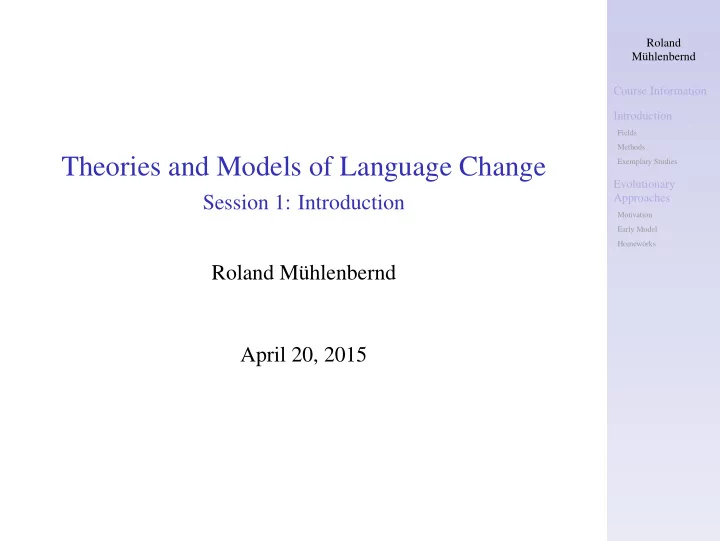

Roland Mühlenbernd Course Information Introduction Fields Methods Theories and Models of Language Change Exemplary Studies Evolutionary Session 1: Introduction Approaches Motivation Early Model Homeworks Roland Mühlenbernd April 20, 2015
Course Information Roland Mühlenbernd Course Information Introduction Fields Methods Exemplary Studies ◮ Roland Mühlenbernd Evolutionary Approaches Email: roland.muehlenbernd@uni-tuebingen.de Motivation Early Model Π Room 1.24 (Wilhelmstr. 19) Homeworks w 3 http://www.sfs.uni-tuebingen.de/~roland Introduce yourself...
Course Information Roland Mühlenbernd Course Information Introduction Fields Methods Exemplary Studies ◮ Time: Tuesday 14-16 Evolutionary Approaches ◮ Place: Verfügungsgebäude 1.19 Motivation Early Model ◮ Tasks: regular homework (80 % ), final exam (60 minutes) Homeworks ◮ Assessment: 3 CP (Proseminar) ◮ Web: http://www.sfs.uni-tuebingen.de/~roland/LC2015 ◮ ILIAS: https://ovidius.uni-tuebingen.de/ilias3/
What is Language Change? Roland Mühlenbernd Course Information Introduction Fields The change of... Methods ◮ linguistic forms Exemplary Studies Evolutionary ◮ linguistic meanings Approaches ◮ sound pattern Motivation ◮ language use ◮ phonological systems Early Model Homeworks ◮ the structure of the ◮ (morpho-)syntactic language community coding/structure ◮ the expressiveness of (a) ◮ semantic assignments language ◮ pragmatic strategies ◮ the linguistic faculty of language users
Related Fields? Roland Mühlenbernd Course Information Introduction The temporal development of human language(s) is topic in Fields Methods different disciplines in linguistics: Exemplary Studies Evolutionary ◮ Language Evolution Approaches Motivation ◮ Historical Linguistics Early Model Homeworks ◮ Sociolinguistics In what senses distinguish these fields from each other? ◮ the time frame ◮ the way of seeing language ◮ the methods
Methods Roland Mühlenbernd Course Information What is the Scientific Method ? Introduction Fields ◮ research, data acquisition Methods Exemplary Studies ◮ theorize Evolutionary Approaches ◮ test Motivation Early Model ◮ evaluate Homeworks Field Work, Comp. Model, Theory Experiments Simulation structure, behaviour
Example I: Weak Tie Theory Roland Mühlenbernd According to Milroy and Milroy (1985), new linguistic Course Information (phonetic) variants (as a result of speaker innovation) Introduction Fields ◮ emerges generally on so-called ‘weak ties’ Methods Exemplary Studies ◮ spreads via ‘central’ members of the local community Evolutionary Approaches Motivation Early Model Homeworks Figure: The Strength of Weak Ties, Granovetter (1973)
Example II: Self-Organization of Vowel Systems Roland Mühlenbernd Course Information Introduction Fields Methods Exemplary Studies Evolutionary Approaches Motivation Early Model Homeworks Figure: Survey of Vowel Systems, Schwartz et al. (1997) Figure: Simulation of MAS, Jäger (2008)
Language Evolution: Fields of Research Roland Mühlenbernd Course Information Introduction Fields Methods Exemplary Studies Evolutionary Approaches Motivation Early Model Homeworks source: ’Language evolution: consensus and controversies’ (Christiansen & Kirby 2003)
Motivation Roland Mühlenbernd Course Information Introduction ◮ evolutionary models view language change as directed Fields Methods Exemplary Studies processes rather than arbitrary fluctuations Evolutionary ◮ language change shows general pattern on a larger scale Approaches Motivation ◮ Georg von der Gabelentz (Die Sprachwissenschaft, 1891) Early Model Homeworks attributes most changes to two counteracting forces: strive for brevity and need for clarity ◮ opposed selective pressures ◮ “brevity” leads to reduced variants and overuses of the same lexical form(s) ◮ “expressiveness” invites to move from one set of lexical forms to another
Spiral Model of von der Gabelenz (1891) Roland Mühlenbernd Course Information Introduction The change of syntactic coding in languages Fields Methods Exemplary Studies Evolutionary Approaches Motivation Early Model Homeworks
Homeworks Roland Mühlenbernd Course Information Introduction Fields Methods Exemplary Studies Evolutionary ◮ Register on ILIAS Approaches Motivation ◮ Read the following article and solve the appropriate Early Model Homeworks exercises given on ILIAS: ‘Language change as cultural evolution: Evolutionary approaches to language change’(Rosenbach, 2008), Sections 1 - 3 (pages 23 - 31)
Recommend
More recommend